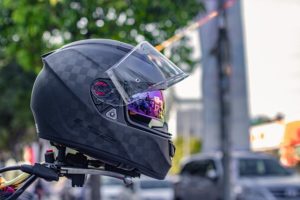Before we can understand whether or not motorcycle helmets can prevent concussions, it is important to understand how a helmet works. Most helmets are constructed of two layers: a hard and protective outer surface, and an inner layer which is often made of hardened foam.
When sudden impact occurs or when you hit your head against a hard surface, the protective outer shell of the helmet dissipates much of the force of head impact. This spreads the force across the perimeter of the helmet. This reduces your chance of skull fractures and wounds to the scalp. The foam layer absorbs some of the impact of the strike.
From the sounds of things, you might feel that helmets provide ample protection against concussions. After all, absorbing the impact should protect you and keep you safe from injury. And while helmets may reduce the risk of some types of traumatic brain injury, concussions still commonly occur.
For a free legal consultation,
call 1-800-668-6729
This is because the brain is still susceptible to other types of head injury. When you are involved in an accident and your head strikes a hard surface, the helmet may indeed absorb and disperse some of the force. But the brain is still jarred within the skull. This immediate acceleration and deceleration of the brain inside the skull can result in bleeding, swelling, and damage to the brain tissue.
How Do Rotational Forces Affect the Brain?
In addition, the brain can be affected by rotational forces. Unlike the forward and back or side to side moving inside the skull, rotational movement of the brain can result in more traumatic brain injuries. Twisting or rotational movements of the fluid within the skull can twist and damage brain cells. These shearing forces can result in irreversible brain damage.
Click to contact our personal injury lawyers today
Berkeley News reports that a company called BrainGuard, founded by a neurologist, has created helmets that help reduce rotational forces that can lead to concussion and brain damage. Designer Knight reports that traumatic brain injuries are the world’s leading cause of death and disability.
Complete a Free Case Evaluation form now
Helmet manufacturers have changed and evolved their designs over the years. As concussions and traumatic brain injury have plagued football and other sports, sports helmets have become more effective at preventing concussions. These changes to football helmets have also led to changes to motorcycle helmets, as well.
In June, 2023, new regulations will be instated in the UK. These motorcycle helmet regulations require that all modular helmets be tested both with the chin guard lowered and with it open. Additionally, for added safety, all helmets must be sold with reflective stickers. Helmets must also be tested in a twisting or rotational scenario. This is being enforced as rotational forces have been found to cause significant damage.
One argument against helmets is that they can produce a false sense of security. This can lead to the motorcycle rider making more risky decisions or riding in a more dangerous fashion since they feel the helmet will protect them if a crash occurs.
At the Law Firm of Kass & Moses, we firmly believe that the decision whether or not to wear a helmet should rest in your own hands. Protective gear like helmets, reinforced jackets, and gloves have been shown to reduce the risk of injuries. But as we have learned, injuries like concussions still occur frequently.
If you or a family member have suffered a concussion or traumatic brain injury in a motorcycle accident, contact the Law Firm of Kass & Moses today. Just a quick phone call to 1-800-MOTORCYCLE will entitle you to a complete case evaluation at no charge. Call us today to learn how we can help you! Let us know if motorcycle helmets prevent concussions in your case, as well.
Call or text 1-800-668-6729 or complete a Free Case Evaluation form


